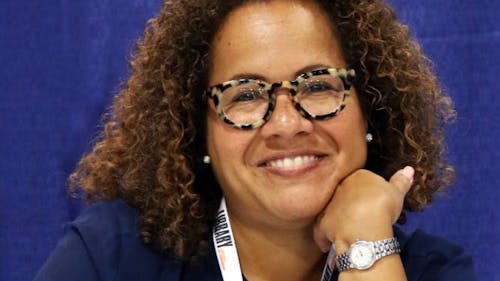Rutgers professor wins Frederick Douglass Book Prize for revealing story of runaway slave

A Rutgers professor was selected as one of the winners of the Frederick Douglass Book Prize last week for her book on the life of a female runaway slave.
The prize is awarded every year by the Gilder Lehrman Center for the Study of Slavery, Resistance, and Abolition for the best book written about slavery or abolition, according to the Yale Macmillan Center. This year, the $25,000 prize was shared between Erica Armstrong Dunbar, a Mary Beard Professor in the Department of History at Rutgers and Tiya Miles, a professor of History and the Radcliffe Alumnae Professor at the Radcliffe Institute for Advanced Study at Harvard University.
Dunbar’s book, titled “Never Caught: The Washingtons’ Relentless Pursuit of their Runaway Slave, Ona Judge,” tells the story of how a woman named Ona Judge escaped from former President George Washington and First Lady Martha Washington. She said the inspiration for the story came from an 18th century newspaper she was reading to complete research for another project.
“I came across a runaway slave advertisement,” she said. “I asked, ‘Who is the slave that ran away from George Washington and why is he advertising for her in a newspaper?’”
After discovering Judge, Dunbar said she was captivated by the story and decided she needed to write about it. Writing the book took nine years because Dunbar traveled to all the places Judge lived in order to gather information about her life.
When Washington became president, Judge was forced to travel to all the places he went as well. Judge lived in Mount Vernon, V.a., New York and eventually Philadelphia, which was where she ran away from to escape to New Hampshire. Since Judge’s life covered so many parts of the early United States, Dunbar said she was able to write a more far-reaching and broad story about slavery, fugitive status and freedom.
By focusing on Judge instead of the Washingtons, the book also looks at the founding of the nation from a different perspective. Dunbar said it was important for her to write about the history of enslaved people, particularly women, because those types of stories were rare in the courses she took while at college.
“These women … who walked and lived and breathed were part of the American narrative but don’t appear in the same number of books,” she said.
While being a slave was a very individualized experience, women slaves had a different set of responsibilities and dangers, such as sexual assault. This made their experiences unique, she said.
Dunbar first decided to study history because she liked the idea of telling stories in high school. Although she originally majored in history as a pre-law student at the University of Pennsylvania, she found her passion in uncovering the lives of those who lived in the past and continued her history studies in graduate school.
She said history was important for everyone to learn because without knowledge about the past, whether national or even personal history, there is no way to situate the present.
“Without knowledge of everything happening before the present, there is no real way to construct a progressive future,” she said.
Regarding the book prize, Dunbar said she was honored to receive the award. Especially since the award was named after Frederick Douglass, one of the most well-known black abolitionists, it was appropriate for Dunbar to be recognized for telling Judge's story.
“Her story will be known forever,” she said. “She will no longer be hidden or unknown … I hope Ona Judge is somewhere smiling down, knowing her life was recognized.”
Dunbar, along with Miles, will be presented the prize at a reception in New York City on Feb. 28, 2019. This year is also the 20th anniversary of the Frederick Douglass Book Prize, according to the Yale Macmillan Center.



